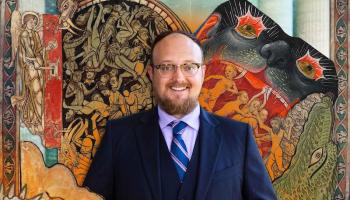Study Explores Online Dynamics Fueling Conspiracy Beliefs

As the saying goes, it takes a village to raise a child. New research suggests it also takes a village to raise a conspiracy theory.
In a recent study published in the journal Nova Religio, T. Kenny Fountain, associate professor and director of the University of Virginia’s Writing and Rhetoric Program, and former UVA graduate student Chandler Jennings examine the role of digital environments in nurturing belief in conspiracy theories. Their article, "Presencing, Immersion, and Community: How Conspiracy Theory Belief Is Kindled Online," delves into the psychological and social mechanisms that make individuals susceptible to such beliefs.
“Conspiracy theories have become an influential mode of political discourse in the 21st century,” Fountain said. “Politicians, pundits and everyday people promote conspiracy theories across a host of media platforms as a way of grappling with uncertainty, signaling political affiliation and reinforcing social bonds. As a scholar of rhetoric, I’m interested in the persuasive strategies that conspiracy theories use to shape, reaffirm and change beliefs.”
In their paper, Fountain and Jennings, who completed his master’s in English at UVA and is now a Ph.D. student at Brown University, propose that experiences of immersion and emotional "presencing" — a heightened sense of immediacy and involvement — are pivotal in fostering conspiracy theory beliefs, particularly in online communities. They draw upon existing literature in religious studies and psychology to establish a connection between the human tendency to become absorbed in imaginative ideas that seem compelling and mysterious and the feelings of community provided by buying into conspiracy narratives that others hold.
The authors build on the work of anthropologist Tanya Luhrmann who explores how religious and spiritual beliefs are formed. They suggest that Luhrmann's concepts of "faith frames," "paracosms" (imaginary worlds), and "religious kindling," — the means by which religious beliefs are created and sustained — offer valuable insights into the experiences of those who adopt conspiracy-based belief systems where engagement, emotion and community play key roles in shaping what feels true.
The study also incorporates perspectives from rhetorical and literary research on how presencing and narrative immersion, or intense engagement with an imaginary world, provide a more comprehensive understanding of how people become absorbed in ideas for which little proof exists. Using digital ethnographic data, the authors illustrate how emotional presencing, imaginative absorption and narrative immersion are present in the online activities of groups like QAnon, which they describe as a "religiously inflected conspiracy theory."
“It was through an intensive survey of hundreds of articles on the psychological bases of conspiracy belief that we were able to see clearly the importance of absorption and immersion to the current prominence of conspiracy theories in political discourse,” Jennings said. “This is a pattern that has been partially buried even in the psychology literature itself and in the public discourse around conspiracy theories and their political harms. Our hope is that our exploration of this element of conspiracy theories can contribute to a more nuanced and thoughtful understanding of their allure in order to better combat their negative effects.”









